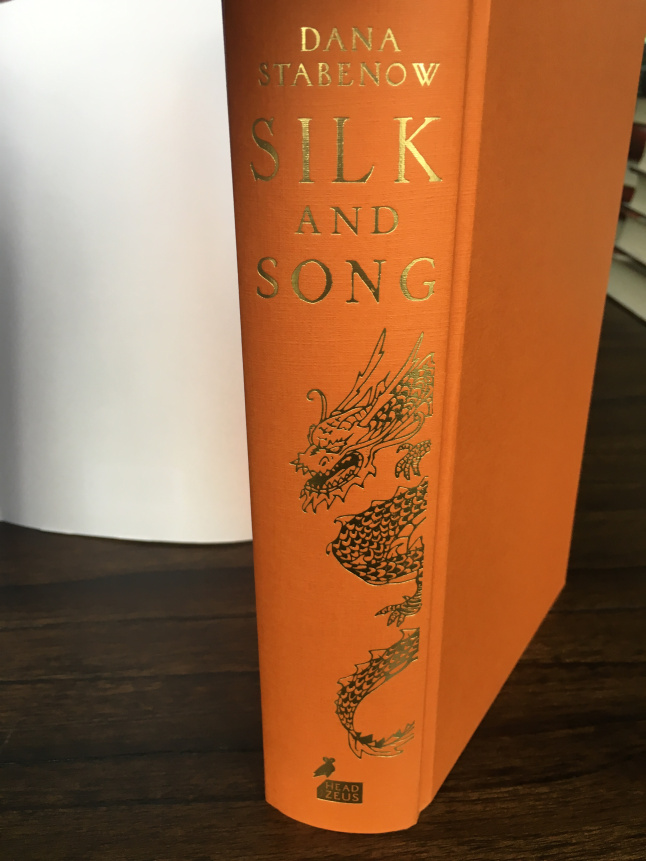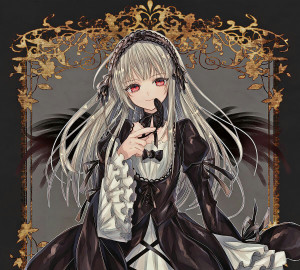Susan Abulhawa is both a Palestinian American author and an activist for Palestine. She was the daughter of refugees from the 1967 War and born in Kuwait before moving to the US and then back to Kuwait and eventually to East Jerusalem. Her years there would leave an impact that would eventually come out in her writing years later. She would attend college in the U.S. and earn her master’s in Neuroscience from the University of South Carolina. It was around this time that she returned to Palestine in 2001 and 2002 and visited Jenin Refugee Camp. The Jenin Massacre had occurred in Spring of 2002, and so she witnessed the raw aftermath of that reality. Her time spent in the camp inspired her to write her novel Mornings in Jenin (“Susan Abulhawa: Novelist and Humanitarian”).
Though she was on the path to become a writer in the medical field, her experiences and the pulls of her heart led her to complement this career with that of a novelist (“Susan Abulhawa: Novelist and Humanitarian”). One can see both her personal connection to the history and present-day situation she writes about, as well as her desire to share this reality of the occupation and struggle in Israel/Palestine with her readers. She allows her views and her personal story to show through the characters in her novels, as well as to tell a greater story of what is going on. It is also interesting to see the role that women played in her novels and the message she is sending through those roles. I have appreciated her ability and her willingness to represent two vulnerable populations well and use writing as a tool to stand for both women and Palestinians.
In her first novel, Mornings in Jenin, a Palestinian family is displaced into what should be a temporary resting place after Israel becomes a state in 1948. Their life in Jenin Refugee Camp is told through the voice of a girl, the granddaughter of the town patriarch who offers the stories of her brothers as well as her own. Throughout the novel, one is introduced to a history often unknown to the surrounding world and is introduced to the misconceptions of a refugee camp, such as that it consists of tents and shacks on a wide expanse of land. While refugee camps generally begin this way and are intended to be a temporary fix until the refugees can either return home or resettle elsewhere, determination and and an undelivered right of return have led to more long-lasting homes now 70 years old. Belief that they might someday return home has kept many from resettling, and so they remain in this period of hope and waiting (“Mornings in Jenin”).
A 4-year old Syrian refugee camp (Za’atari Camp), much like what one might imagine when thinking of refugee camps. Photo taken by: Morgan Erickson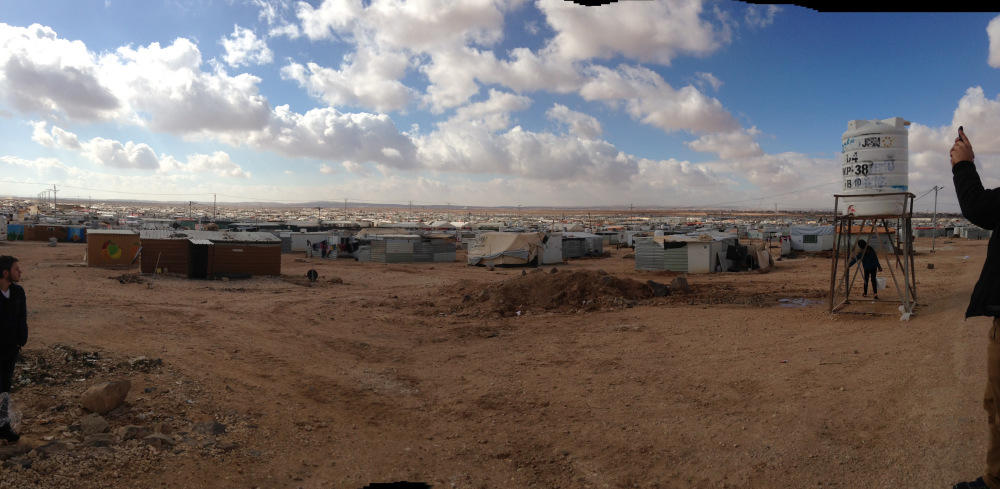 A 70 year-old Palestinian refugee camp in Amman, Jordan. Photo taken by: Morgan Erickson
A 70 year-old Palestinian refugee camp in Amman, Jordan. Photo taken by: Morgan Erickson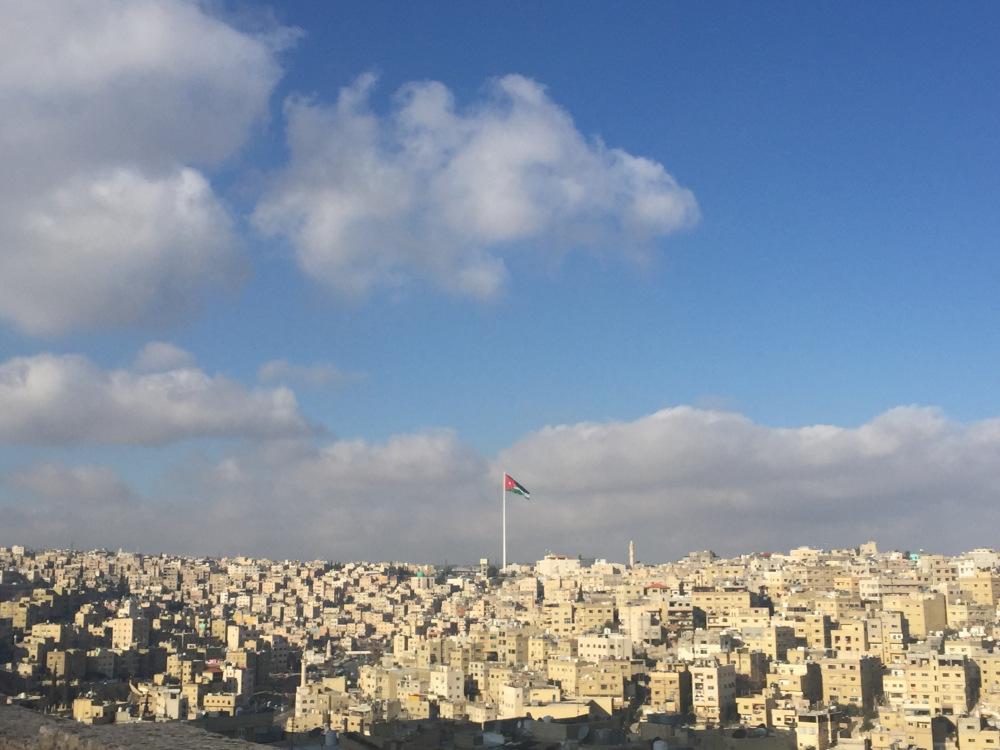
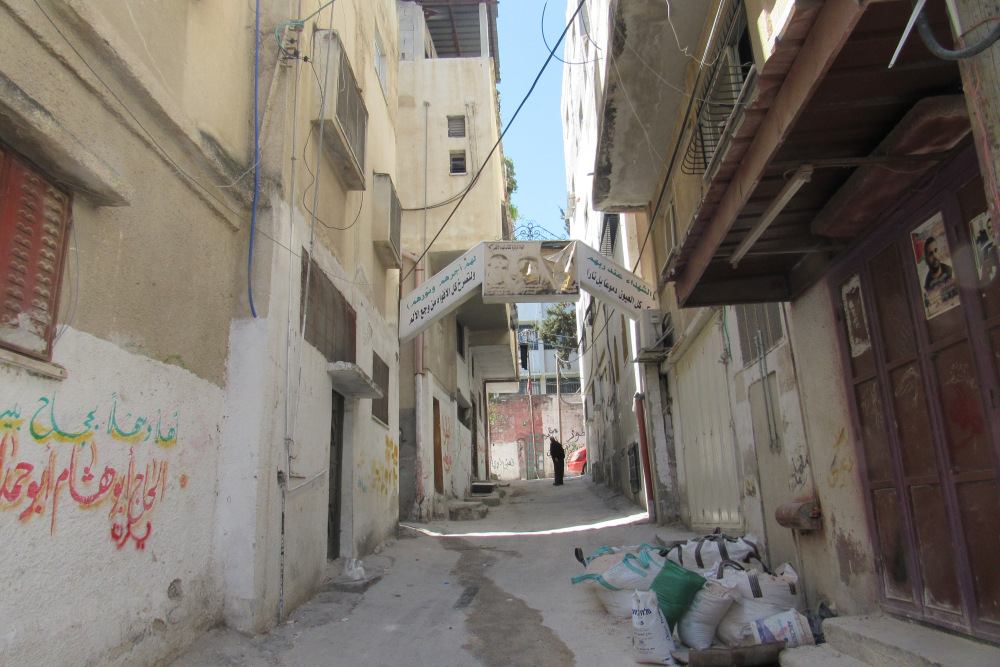 Inside a 70-year old Palestinian refugee camp in the West Bank. Photo taken by: Morgan Erickson
Inside a 70-year old Palestinian refugee camp in the West Bank. Photo taken by: Morgan Erickson
The Jenin Massacre was an enormous retaliation from Israel after a suicide bombing that occurred during a Passover Seder celebration in 2002 (Smith, 501). According to Smith, “Palestinian charges of a massacre were disproved but 4,000 Palestinians were left homeless and the army blockaded access to the camp by relief and medical personnel for six days after the fighting stopped” (501). This kind of assault and retaliation against Palestine, instigated or not, occurs all the time and creates for an especially traumatizing and tragic environment to grow up and live in. When I visited the camp, we were introduced to the Freedom Theatre which is a theatre that was started by an Israeli woman for children in the camp to have an outlet and a way to express themselves from all that they were experiencing. It has been a place of hope and courage for these children, and an opportunity to speak out against the occupation through non-violent means, as well as to critique issues in their own society such as abuse against women and children. It has offered a place of light in the midst of great darkness, and allowed these kids’ creativity to shine through creative resistance in their fight for freedom.
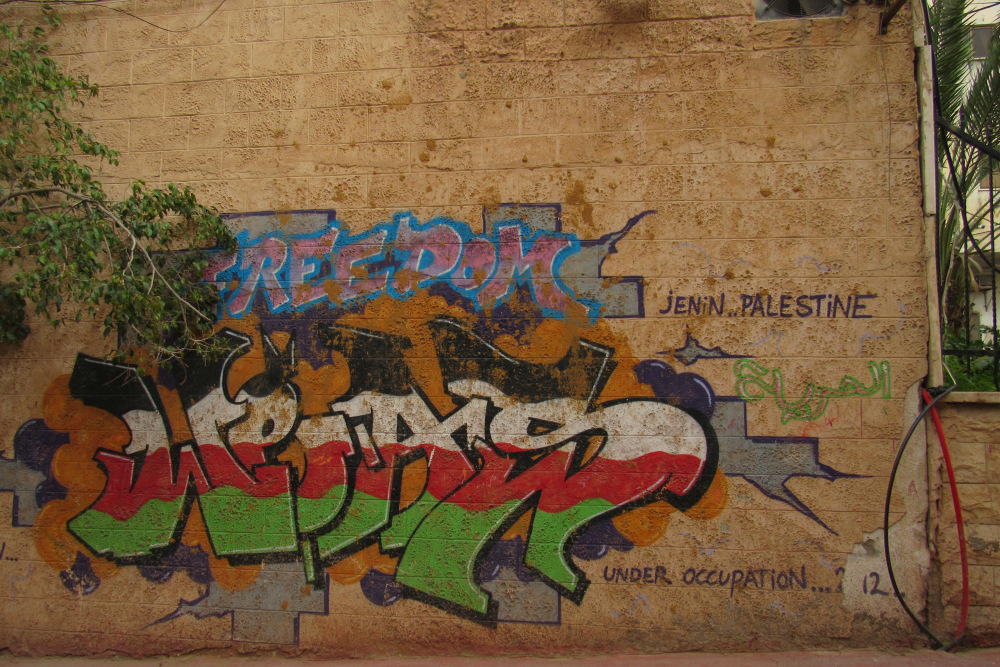 Inside Jenin Refugee Camp. Photo taken by: Morgan Erickson
Inside Jenin Refugee Camp. Photo taken by: Morgan Erickson
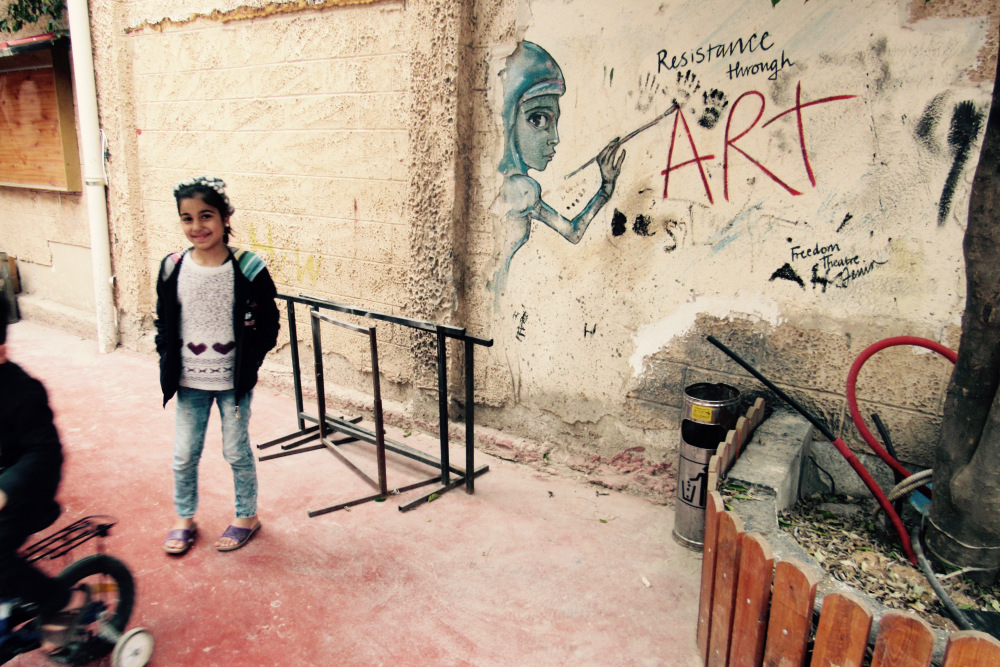 Outside The Freedom Theatre in Jenin, Palestine. Photo taken by: Morgan Erickson
Outside The Freedom Theatre in Jenin, Palestine. Photo taken by: Morgan Erickson
The Freedom Theatre
In her novel The Blue Between Sky and Water, a Palestinian family is exiled to Gaza after the war in 1948. It displays what it’s like for Palestinians to live in Palestine before the occupation and then in the Gaza Strip during it, while using strong and powerful women to help keep the family together in times of great trial. One of these characters is a niece who grows up in foster care in the US searching for her real home before coming back to Palestine (Rheannon). This closely resembles Abulhawa’s own story as she had moved around a lot as a child and lived in an orphanage during her time in East Jerusalem (Khan). Abulhawa would also return to Palestine after many years in the US of possibly looking for her real home.
Abulhawa is also the author of My Voice Sought in the Wind, a poetry collection. Her poem, “Wala,” describes the daily routine of a Palestinian man working under the occupation of Israel, with long lines and checkpoints and discrimination. She describes the checkpoint as a “cattle cage” to portray the dehumanization that takes place and provide the image of hundreds of men jammed together, all waiting to be shuffled through hours later so they can have a chance of finding work. I remember hearing stories like this all the time when I was in Palestine, stories of little things like this that Palestinians are forced to undergo everyday until one day all the little things add up and create a big thing, an unbearable thing, and the person breaks. The checkpoints and the required documents and the violence and the longer routes, all of them reminders to the Palestinians that they are less than. I remember listening to a Palestinian college student tell us how his college is five minutes away, but because he is not allowed to take that route, he must go the long way and drive three hours to school every single day. All because he is Palestinian. And amidst all of it is the deeply ironic undertone of a history that is once again repeating itself.
Susan Abulhawa’s poem, “Wala:”
It’s 3 am
In the cattle cage
The line is long
And thick
With bodies
You wait
A jibneh sandwich
With cucumber
In a plastic bag
Clutched in your callused laborer’s hand
Your wife prepared your breakfast and lunch
She was up before you
And together you prayed a predawn salat
She kissed your face and said
Allah ma’ak ya habibi
Allah be with you, my love
You kiss the faces of your sleeping babies
You haven’t seen them awake in months
And you wonder
Has Walid’s voice begun to crack yet?
Have Wijdad’s hips begun to flare?
How big was Suraya’s smile when she came home
with her report card?
It’s 4 am
In the cattle cage
Still, you wait
The line before you is so long
And behind you now, it is longer
Few speak
You’re packed so damn tight
That you hold one another upright
You see your own fatigue
Reflected in the weariness etched on
The faces all around you
You look away
Pine for a smoke
But who the hell can afford that?
You stare at the graffiti beyond the
Iron bars holding you in
Written just for you
Written
By zionist settlers sucking the breath from your lungs
You understand the meaning
Of their English words
“Die Sand Niggers”
Sometimes
You pine for that, too.
It’s 5 am
In the cattle cage
The soldiers arrive
The line loosens
You take one step forward
Propelled by the weight of bodies
Behind you
Your jibneh sandwich
With cucumber
In a plastic bag
Is crushed.
It never survives
It’s 7 am
In the cattle cage
Now is your turn
You produce your papers
Unfold and refold
Eyes down
Heart down
Your shoes are down on their luck
But
You’re out of the line
Fifteen men before you were pulled aside
And you tried not to look
Not to hear the one begging
Don’t hit me
It’s 7:30 am
On the cattle bus
You ride
The country they stole from you
Seeds outside your window
And you imagine
The man you would have been
The man you should have been
Out there
Riding the family steed
The thoroughbred mares your grandfather
Raised and nurtured and loved
In a Palestine
Un-raped
Un-stolen
It’s 8 am
You get off the cattle bus
Your crushed jibneh sandwich
With cucumber
In a plastic bag
In one hand
Your eyes down
Heart down
You put your toolbox down to knock
On the zionist settler’s back door
Where the help goes
But
The zionist settler boss-man yells
Wala
Mish hon el yom!
Not there today
Boy!
And all you can do is thank Allah that your
Wife and your babies are not
There to hear them call you
Wala (quoted in Cobban)
Poem reading of “Wala”
Activism has also been an important part of Abulhawa’s life as she is the founder of Playgrounds for Palestine, an organization that builds playgrounds for kids in refugee camps and other parts of Palestine (“Susan Abulhawa: Novelist and Humanitarian”). Her writing is also a form of activism as she informs her readers of what is going on in Israel/Palestine, and shares that story with the world.
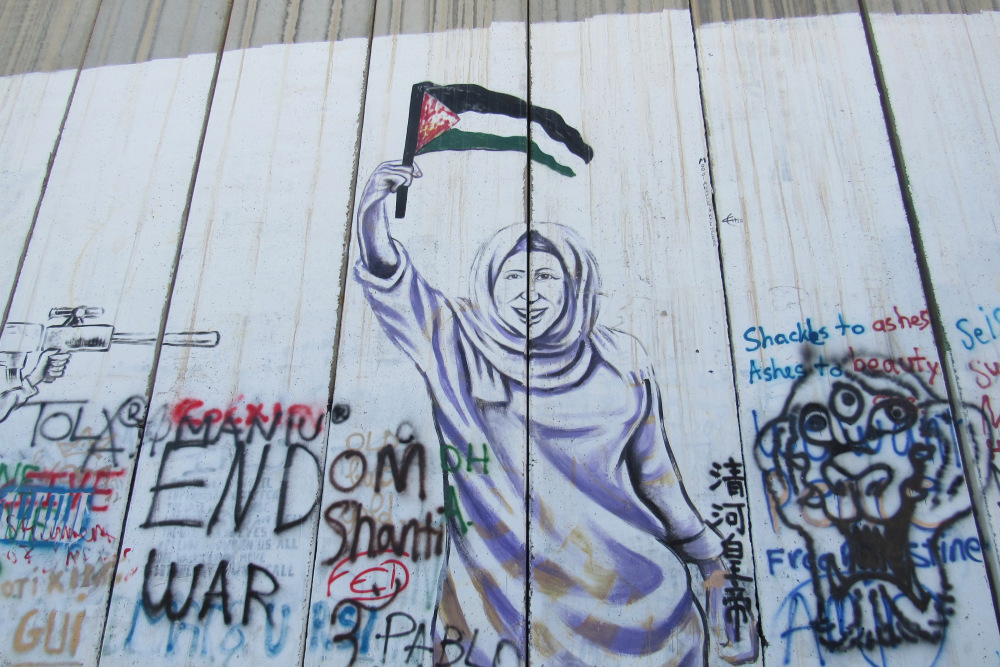 A mural of a Palestinian woman on the wall that separates the West Bank from Jerusalem. Photo taken by: Morgan Erickson
A mural of a Palestinian woman on the wall that separates the West Bank from Jerusalem. Photo taken by: Morgan Erickson
By: Morgan Erickson
Works Cited
Cobban, Helena. “‘It’s 3 am, in the cattle cage’-Susan Abulhawa publishes first book of poetry.” Mondoweiss, 19 Nov. 2013, www.mondoweiss.net/2013/11/cattle-abulhawa-publishes/. Accessed 9 Oct. 2017.
Khan, Abdullah. “This is a Palestinian story: Susan Abulhawa.” The Hindu, 29 Aug. 2015, www.thehindu.com/features/magazine/susan-abulhawa-on-the-blue-between-sky-and-water/article7590545.ece. Accessed 25 Sept. 2017.
“Mornings in Jenin.” Bloomsbury Publishing, www.bloomsbury.com/us/mornings-in-jenin-9781608190461/. Accessed 25 Sept. 2017.
Rheannon, Francesca. “Families in War: Novels by Susan Abulhawa & Jacqeline Sheehan.” Writer’s Voice, 14 Jan. 2016, www.writersvoice.net/2016/01/susan-abulhawa-jacqueline-sheehan/. Accessed 25. Sept. 2017.
Smith, Charles. Palestine and the Arab-Israeli Conflict. 8th ed., Bedford/St. Martin’s, 2004.
“Susan Abulhawa: Novelist and Humanitarian.” IMEU, 10 Nov. 2015, www.imeu.org/article/susan-abulhawa-novelist-and-humanitarian. Accessed 25 Sept. 2017.
Advertisements Share this:


